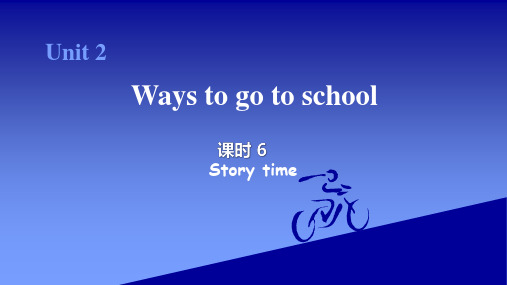小六英语第一、第二讲 李霭如
牛津英语上海版六年级第一学期 6A Unit 2教案设计(6课时,含教后感)

Unit 2 I have a good friendPeriod 1教学要求:1. Adverbs of frequency2. Simple present tense重点难点:Using the simple present tense to express preferences.E.g. she likes to play.Pre-task preparationGuess: Which word is it? --- FriendFree talk: Do you have a friend?Could you tell us something about your friend?Review adverbs of frequency.While-task procedure:I. Look and sayS1: What does a dog usually do?S2: A dog always watches TV.usually sleeps.sometimes drinks milk.never climbs mountains.eats cakes.goes shopping…板书always usually sometimes never Never Ss read one by one.一般现在时第三人称单数动词+s( II. Ask individual students:1 Do you have a friend?2 What do you do together?3 How often do you play games?4 Do you love each other? 不上,前面Free talk已谈论过)III. Read the poem silently. Ask the following questions.1 What is Alice’s friend?2 Is she big or small?3 How old is she?4 How often do they go to the park?5 What do they sometimes watch?6 Does the dog go out at night?IV. Read the poem sentence after sentence, pay more attention to pronunciation.Invite some Ss to readV. Look and say1. My friend Sally eats breakfast every day.2. My friend Sally always goes to school.3. My friend Danny sometimes does morning exercises.4. My friend Sally always does her homework at night.5. My friend Eddie usually cleans the table.6. My friend Eddie sometimes plays football.7. My friend Judy never talks in the class.My friend Judy doesn’t talk in class at all.8. My friend Judy goes to the library every day.My friend Judy always goes to the library.9. My friend Peter sometimes reads books in the garden.10. My friend Peter never climbs trees.My friend Peter doesn’t climb trees at all.11. My friend Peter always goes swimming.My friend Peter goes swimming every day.Invite individual Ss first, then other Ss, at last the whole class repeat.强调频度副词的正确使用以及一般现在时第三人称单数动词+sVI. Read the second poem.help each other help other people = help othersPost-task activity:Think and say: What do you usually do with your good friend?_______ and I are good friends.We like to be together.We always …( VII. More about friend.F Friends in need are friends in deed.R Remember you at any time.I I help you and you help me.E Equal.N Never tells a lie to you.D Difficult to forget. 不上)Consolidation1.Workbook 6A P82.Copy the new words & phrases3.Read and recite P9教后记:两首诗歌一起教学难度较大,后一分为二,在第二课时时除了完成教学任务,当堂加了一个笔头的一般现在时操练,(如下),检测学生们对这一时态的掌握情况,批改下来大部分同学还不错,个别学生问题较大,要个别辅导。
人教pep英语六年级上册Unit2课时6:Story time授课课件

知识点 1 different['dɪfrənt]不同的 british['britiʃ]不列颠的,英国的,英国人的
British food英国食物
Chinese food is so different from British food. 中国食物不同于英国食物。
知识点 2
In the UK you drive on the
Annie:Where is the door? Amy, there is no door on the bus!
Amy:Haha, you're looking at the wrong side again!
Amy 的朋友Annie一家人来中国,Amy 去迎接 他们。之后由于中国和英国的不同的饮食习惯和交 通规则而产生了一些不便。是什么呢?
1. British food Chinese food
2. walk or drive
knife and fork chopsticks
the UK on the left side China on the right side
3. the door of the bus
the UK on the left side China on the right side
1. 跟录音读故事 2. 分小组朗读。
播放音频
两人一组分角色朗读。
一、填空 1.Chinese food is so different __fr_o_m__ British food. 2.In the UK you drive on the __l_e_ft__ side. 3.In China, people drive on the __ri_g_h_t _ side. 4.We must look right _b_e_fo_r_e_ crossing the road. 5.There is no door __o_n___ the bus!
电子课件-《英语(第二册)(第三版)》-A01-4402 英语 第二册 第三版 课件-Unit 1 lesson 1

1
The Strange Echo
阅读课文,通过小组讨论以及自己的思考,回答问题并填充 表格:
1. Who was Mark Twain? 2. Could you list some Mark Twain’s novels and stories?
His Novels and Stories
In Chinese
time & times 时间;次数
◆ time 用作不可数名词,表示“时间”。 ◆ times 用作可数名词,表示“次数”“倍数”。 注意:“一次”“两次”为“once ”“twice”,三次或三 次以上则用times,如 five times(五次),twenty times(20 次)。
Unit 1
Industry and Manufacturing
1 Lesson One The Strange Echo
2 Lesson Two
Alexander Fleming
3 Lesson Three
Zheng He and Columbus
Unit 1
Great People
Lesson one
1
《汤姆·索亚历险记》
In English The Adventures of Tom Sawyer
2 《哈克贝利·费恩历险记》 The Adventures of Huckleberry Finn
3
4
5
P1-P2
Mark Twain* was a famous American writer. He was also a famous humorist. He traveled very much giving speeches in different places. During these speeches he always told several funny stories. He also liked to listen to funny stories. There are many humorous stories connected with his name.
六年级上册英语-Unit 2 读一读小故事 冀教版PPT课件

知识讲解
Be careful, Neva. Don’t stand
5 too close to the street.
Thanks.
Neva doesn't like to talk. She never says much.
知识讲解
6
Hello, boys and girls. Are you excited for the first day of school?
Thanks and see you next time!
Yes!
Now, they see the yellow school bus coming. The driver is a woman. She is Ms. Marshall. She is very nice.
知识讲解
7
Please wear your seat belts.
李观仪新编英语教程第六册unit 1 two words to avoid two to remember

An: Keep saying ―if only‖ would not change
anything; on the contrary, it only kept the person facing the wrong way---backward instead of forward. If you form a habit of saying it eventually, the phrase can really turn to an obstruction, a real roadlock, an excuse for not trying any more. When one begins to say ―next time‖, it means he has already decided to stop crying over the past but apply the lessons he has learned from his experience. He is on the way to overcoming his problem.
Dictionary work
1. insight: the capacity to gain an accurate and deep instinctive understanding of a situation 洞察力
2. checkered tablecloth: tablecloth that has a pattern consisting of alternating squares of different colors. The British spelling of checkered is chequered. 3. chew the cud (slang): think reflectively cud means literally “partly digested food returned from the first stomach of ruminants(反刍动物)to the mouth for further chewing” (反刍的食物) P4. Cf. chew the fat/rag: to talk together in a friendly, leisurely way 闲 聊 4. gnome: (in legends) a little old man who lives underground and guards the earth’s treasures 土地神; a small ugly person 侏儒
小学英语教科EEC版六年级上册Unit1 Going to School《Class 2 Textbook p.5》优质课教案公开课教师试讲教案

小学英语教科EEC版六年级上册Unit1 Going to School《Class 2 Textbook p.5》优质课教案省级比赛获奖教案公开课教师面试试讲教案【名师授课教案】1教学目标1、知识技能a.熟练对人的名字和姓氏进行问答b.单词:first name, last name, twins, friendc.句子:My name’s…=My name is…I’m…=I am…Is Wang your first name?2、情感态度价值观a.培养对英语学习的持久兴趣,特别是读写、单词记忆的兴趣。
b.了解中西方姓名写法的习惯。
c.在真实的语境中体验参与。
3、获取知识的方法途径在模仿中体会发音规律。
2学情分析我选取的教材是EEC英语第五册第一课第二课时。
这是Tino英语课文的第一部分。
前一部分,是对重点单词,重点句型的初步感知,本部分重点内容是对姓名的提问,带领学生认识新朋友,走进Tino’sEn glishLand.需要详细讲解的是第二部分和第四部分,我将运用多媒体收集学生感兴趣的国内外名人区分他们的名和姓,使学生明确中外文化的一个重大差异,名文化差异。
突出重点,突破难点。
3重点难点教学重点:熟练对人的名字和姓氏进行问答教学难点:了解中西方姓名写法的习惯与区别4教学过程I. warm up1. Greeting2.ChantII. RevisionIII. New Lesson1. Hi.My name’s Sandy Taylor.What’s your name?Hi.I’m Wang Dongdong.(1) T: (拿出Sandy Taylor 头像的背面,放在自己的脸上)。
六年级上册英语Lesson 2 读一读小故事科普版

PROMISE, JUST PROVE.
知识讲解
I see people I want to talk to who are talking to someone else.
知识讲解
I want to start talking to them right away, I don’t want to wait.
知识讲解
When I act respectfully, people will want to talk to me.
课堂小结
John isn’t going to clean his house or wash his car. 约翰不打算打扫他的房子或洗车。 If you are going to do something, then do it. 如果你要做某事,那就去做。
六年级(上册)
Lesson 2 读一读小故事
Warming up
Let’s read a story together!
知识讲解
John lives in a village. But people often call him “Mr. Goingto-do”. Do you want to know why? John always says, “I’m going to do…”, But he never does it.
知识讲解
Every Saturday, John goes to Mr. Smith’s house and talks with him. “I’m going to clean my house tomorrow,” he says, or “I’m going to wash my car next week.”
六年级上册英语课件-Unit 1 读一读小故事 冀教版

61.穷的时候一定要大方,富的时候,就不要摆阔了。生命已经恢复了简单,已经回到了宁静。 81.墙高万丈,挡的只是不来的人,要来,千军万马也是挡不住的。 9.人的活动如果没有理想的鼓舞,就会变得空虚而渺小。 7.人生就像舞台,不到谢幕,永远不会知道自己有多精彩。 96.即使道路坎坷不平,车轮也要前进;即使江河波涛汹涌,船只也航行。 45.松软的沙滩上最容易留下脚印,但也最容易被潮水抹去。 4、时间乃是万物中最宝贵的东西,但如果浪费了,那就是最大的浪费。 97.天下没有不可能的事,只要你有信心、有勇气,腔子里有热血,灵魂里有真爱。 82.只要努力抬起你的双脚,胜利将属于你。 24.试着把光芒留给别人,不用太在意那些有的没的,你会更快乐。
六年级(上册)
Unit 1 读一读小故事
Warming up
Hello everyone! Let's read some stories.
知识讲解
Let's read.
My name is Baby Becky. I say “goo”.I say“blub”. I say “waaaaa”.I say“mine”. I like to help my mother.After lunch, my mother washes the dishes. I dry the dishes.
Let's read.
知识讲解
I like to cook.I open the fridge.I see tomatoes,eggs and milk.
- 1、下载文档前请自行甄别文档内容的完整性,平台不提供额外的编辑、内容补充、找答案等附加服务。
- 2、"仅部分预览"的文档,不可在线预览部分如存在完整性等问题,可反馈申请退款(可完整预览的文档不适用该条件!)。
- 3、如文档侵犯您的权益,请联系客服反馈,我们会尽快为您处理(人工客服工作时间:9:00-18:30)。
英语预科班第一讲教学教案Unit 1 What are we going to do for our holiday?一、单词plan 计划pearl 珍珠instead 代替the Pearl River 珠江have been to 到过cruise 漫游,游弋lot 许多temple 庙a lot of 许多……the Six Banyan T emple 六榕寺clothes 衣服dimsum 点心yummy 味道好的;好吃的二、课文Mr. Webb:Well,it’s your school holiday soon. Whatare we going to do?Janet:Shall we go on the Pearl River Cruise?Ben:A cruise?Boring!Let’s go to Xiangjiang Zooinstead!I’m going to see white tigers.Janet:Oh no. We have been to the zoo in Guangzhou many times. We are going to the Six Banyan T emple. We’re going to take photos, and all of us are going to have fun there.Ben:It’s boring too.Mr. Webb:Let’s go to Baiyun Hill. We are going to watchbirds there.Janet:We can see more birds at the zoo than on Baiyun Hill.Mrs. Webb: Shall we go shopping in Xiajiu Road? Thenwe can have dimsum at the famous Guangzhou Restaurant. Janet:Good idea! I want to buy some new clothes. Thereare a lot of beautiful clothes there.Ben:Great! I like Guangzhou dimsum. Yummy, Yummy!三、语法(一)一般将来时:be going to…… 将要做……1、一般将来时表示将来某一时刻的动作或状态,或将来某一段时间内经常的动作或状态。
常常和表示将来的时间状语连用。
如:tomorrow(明天),next week (下周),the day after tomorrow(后天),from now on(从现在开始),in the future(将来)等。
2、例句:(1)I am going to visit Japan next year.明年他将访问日本(2)They are going to town this Saturday.我们打算星期六到城里去。
(3)The railway is going to be open on October 1.这条铁路将于十月一日通车。
3、时间状语:①next year/week/month②in+一段时间,in the future ,in a week。
③this weedend/afternoon/Sunday④one day,someday (未来的)某天⑤ soon4、选择题( 1) There __________ a meeting tomorrow afternoon.A. will be going toB. will going to beC. is going to beD. will go to be( 2) There ________ a dolphin show in the zoo tomorrow evening.A. wasB. is going to haveC. will haveD. is going to be(3 ) –________ you ________ free tomorrow?– No. I ________ free the day after tomorrow.A. Are; going to; willB. Are; going to be; willC. Are; going to; will beD. Are; going to be; will be ( 4) He ________ in three days.A. coming backB. came backC. will come backD. is going to coming back ( 5) ________ your brother ________ a magazine from the library?A. Are; going to borrowB. Is; going to borrowC. Will; borrowsD. Are; going to borrows ( 6 ) The train ________ at 11.A. going to arriveB. will be arriveC. is going toD. is arriving5、观察下面的短语,请用be going to……形式造句.(1)do some readingY ongxian is going to do some reading this afternoon(2)skip(3)play cards(4)surf the Net(5)write a letter(6)have lunch(一)a lot of和lots of的用法和区别牛刀小试:请选择正确的词语填空:(1)There are trees on the hill.(2)I have apples.(3)I have done work today.(4)That time we had fun。
(5)Because of this race, we have training.(三)on ,at,in 的用法1、on 的用法课本例句:Shall we go on the Pearl River Cruise?We can see more birds at the zoo than on Baiyun Hill.(1)在...上面He laid a hand on my shoulder(肩膀).(2)挂在...上;There is a picture on the wall.(3)靠近,在...旁,沿着She stood on my left.(4)on+具体某日/星期几(要具体到某一天)如:on October 1st在十月一日,on Sunday 在星期日2、at的用法at表示位置,用于面积较小的地方。
课本例句:We can have dimsum at the famous Guangzhou Restaurant. We can see more birds at the zoo than on Baiyun Hill.(1)在……地方、地点(在小地方一般用at)They are waiting at the gate when I go there.当我到达那里时,他们已等候在门口了。
(2)在...时刻(具体某个时间点)Jane will meet her boy friend at ten o’clock .简将在十点钟和她男友见面。
3、in的用法课本例句:Shall we go shopping in Xiajiu Road?We have been to the zoo in Guangzhou many times.(1)在...某地方(在大地方一般用in)They live in France.他们住在法国。
(2)在...期间;在...以后He'll come back in a week. 他将于一周之后回来。
(3)穿着,戴着He is dressed in black.(4)(表示方式)用, 以, 按, 乘, 以…形式They are speaking in English.(5)在某月、季节、年、世纪(较大范围),或者固定结构如,in 2010,in June,in spring 在春天,in the 1980sin the morning/afternoon/evening4、用所给动词的适当形式填空(1)Jim and Li Lei (watch)the football match this evening. (2)—What you (do)tomorrow morning?— I (see)my grandmother.(3)They (go)fishing this Friday?(4)There (be)a birthday party this evening.(5)My sister is going to (call)me at 5:00.四、单项选择题1、The girl white and red is my sister Kate.A、forB、ofC、inD、with2、We usually stay ______home _______Saturday afternoon.A、at;inB、at;onC、in;atD、in;on3、I was born June 1 st,1996.A、inB、onC、atD、of4、I came to China 2011.A、inB、onC、atD、of5、Sally is very happy. There is a big smile her face .A、inB、onC、toD、at五、填空题1、She got married 22.2、We left Hangzhou the afternoon of October 15.3、He called me Sunday morning.4、He phoned me the early morning of June 4.5、They arrived the late afternoon of 20th December.6、My daughter was born _ July 1961.7、The First World War broke out 1941 and ended 1918.8、I shall take a holiday summer.Key:1、at 2、on 3、on 4、in5、in6、in7、in in8、in五、介词用法归纳。
